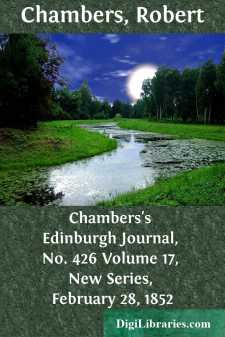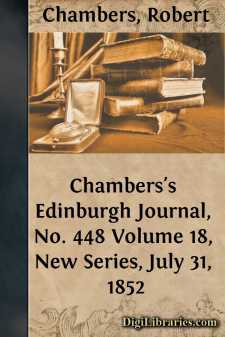Categories
- Antiques & Collectibles 13
- Architecture 36
- Art 48
- Bibles 22
- Biography & Autobiography 813
- Body, Mind & Spirit 142
- Business & Economics 28
- Children's Books 17
- Children's Fiction 14
- Computers 4
- Cooking 94
- Crafts & Hobbies 4
- Drama 346
- Education 46
- Family & Relationships 57
- Fiction 11829
- Games 19
- Gardening 17
- Health & Fitness 34
- History 1377
- House & Home 1
- Humor 147
- Juvenile Fiction 1873
- Juvenile Nonfiction 202
- Language Arts & Disciplines 88
- Law 16
- Literary Collections 686
- Literary Criticism 179
- Mathematics 13
- Medical 41
- Music 40
- Nature 179
- Non-Classifiable 1768
- Performing Arts 7
- Periodicals 1453
- Philosophy 64
- Photography 2
- Poetry 896
- Political Science 203
- Psychology 42
- Reference 154
- Religion 513
- Science 126
- Self-Help 84
- Social Science 81
- Sports & Recreation 34
- Study Aids 3
- Technology & Engineering 59
- Transportation 23
- Travel 463
- True Crime 29
Chambers's Edinburgh Journal, No. 435 Volume 17, New Series, May 1, 1852
by: Robert Chambers
Description:
Excerpt
FORCED BENEFITS.
The maxim, that men may safely be left to seek their own interest, and are sure to find it, appears to require some slight qualification, for nothing can be more certain, than that men are often the better of things which have been forced upon them. Those who advocate the idea in its rigour, forget that there are such things as ignorance and prejudice in the world, and that most men only become or continue actively industrious under the pressure of necessity. The vast advantages derived from railway communication afford a ready instance of people being benefited against their will. At the bare proposal to run a line through their lands, many proprietors were thrown into a frenzy of antagonism; and whole towns petitioned that they might not be contaminated with the odious thing. In spite of remonstrances, and at a vast cost, railways were made; and we should like to know where opponents are now to be found. Demented land-proprietors are come to their senses; and even recalcitrant Oxford is glad of a line to itself.
Cases of this kind suggest the curious consideration, that many remarkable benefits now experienced were never sought for or contemplated by the persons enjoying them, but came from another quarter, and were at first only grudgingly submitted to. A singular example happens to call our attention. There is a distillery in the west of Scotland, where it has been found convenient to establish a dairy upon a large scale, for the purpose of consuming the refuse of the grain. Seven hundred cows are kept there; and a profitable market is found for their milk in the city of Glasgow. That the refuse of the cow-houses might be applied to a profitable purpose, a large farm was added to the concern, though of such land as an amateur agriculturist would never have selected for his experiments. Thus there was a complete system of economy at this distillery: a dairy to convert the draff into milk, and a farm to insure that the soil from the cows might be used upon the spot. But, as is so generally seen in this country, the liquid part of the refuse from the cow-houses was neglected. It was allowed to run into a neighbouring canal; and the proprietors would have been contented to see it so disposed of for ever, if that could have been permitted. It was found, however, to be a nuisance, the very fishes being poisoned by it. The proprietors of the canal threatened an action for the protection of their property, and the conductors of the dairy were forced to bethink them of some plan by which they should be enabled to dispose of the noxious matter without injury to their neighbours. They could at first hit upon no other than that of carting away the liquid to the fields, and there spreading it out as manure. No doubt, they expected some benefit from this procedure; and, had they expected much, they might never have given the canal company any trouble. But the fact is, they expected so little benefit, that they would never have willingly taken the trouble of employing their carts for any such purpose....












